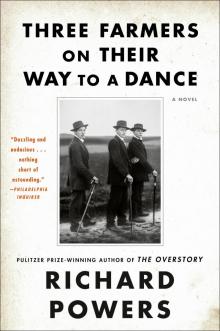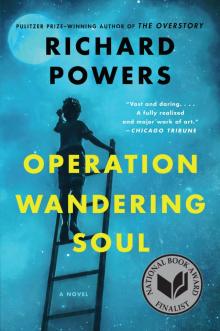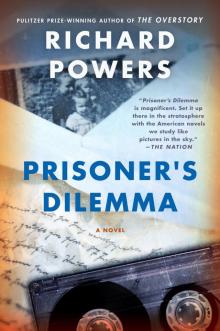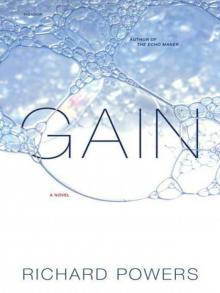- Home
- Richard Powers
The Echo Maker Page 4
The Echo Maker Read online
Page 4
She walked past solid A-frames crumbling away to tar-paper shacks. She wove from Avenue E to Avenue I, between Thirty-first and Twenty-fifth, inside a life-sized photo album of her past. The house of the boy she first loved; the house of the boy she first failed to make love with. The house of her girlfriend of twenty years, who disowned her one day, six weeks after getting married: apparently something the new husband said. This was the town she’d tried three times to escape, each time recalled by perverse family disaster. Kearney had a head-stone all picked out for her, and her job was only to walk randomly around these graveyard streets until she stumbled upon it.
Before Joan Schluter died, she’d given her daughter a stiff cardboard photograph of Great-Grandfather Swanson standing in front of his crumbling house, that chapel to desolation, twenty-five miles northwest of what would become Kearney. The man in the picture held half of his library—either Pilgrim’s Progress or the Bible: the photo was too blurry to tell. On the mud wall of the soddie behind him, dangling from a stag’s antler, hung a gilded birdcage, purchased out east at great expense and dragged a thousand miles overland in an oxcart, taking up precious cargo space that might have stored tools or medicines. The birdcage was more urgent. The body could survive any isolation. Then there was the mind.
Now residents had a cage still more gilded: cheap broadband. The Internet had hit Nebraska like liquor hitting a Stone Age tribe—the godsend every sandhills homesteader descendant had been waiting for, the only way to survive such vacancy. Karin herself abused the Web daily, up in the Sioux metropole: travel sites, auction sites selling discounted but very serviceable clothes, fancy gift foods for winning over her workmates, and, once or twice, the occasional dating service. The Net: a last-ditch cure for prairie blindness. But her dabbling was nothing compared to Mark’s addiction. He and his friends manned two dozen online avatars between them, talking Pig Latin to chat-room housewives, posting long comments on conspiracy theory blogs, uploading questionable images to crazedpics.com. Half their after-plant hours consisted of building up experience points for fantasy characters in various alternate worlds. It panicked her, the number of hours he was willing to spend somewhere purely imaginary. Now he was locked in deeper space, a place where instant messages couldn’t reach. And everything she’d feared the Web might do to him now seemed like heaven.
She wandered around town long enough to outlast his friends’ click-impaired attention spans. The streetlights came on, on those streets that had lights. Now the blocks scrolled and repeated, the streets a simulation more predictable than one of Mark’s online games. She doubled back on Central toward the hospital, keen to get her brother back to herself again.
But Rupp and Cain were still there, kicked back in their hospital chairs. Mark was sitting up in bed. The three of them were playing catch with a wadded-up ball of paper. Mark’s throws were wild. Some went backward, hitting the wall behind him. He threw the way a sailor-suited chimp might ride a tricycle. But he was throwing. The resurrection froze her, Mark’s biggest leap since his truck left the road. Cain and Rupp lobbed him underhand bloopers, which he stabbed at, half a second late. The makeshift ball bounced off his chest, his face, his flailing hands. And every humiliating hit produced a sound that could only be the thickest laughter. She wanted to scream. She wanted to clap with joy.
In the hallway, as they left, she thanked her brother’s friends. What did it matter? The surviving part of her was beyond pride.
Rupp waved her off. “He’s still in there. Don’t worry. We’ll dig him out.”
She started to ask whether they’d been together, the night of the accident. But she didn’t want to jeopardize this brief alliance. She showed them the note. “Do you know anything about this?”
They both shrugged. “No idea.”
“It’s important,” she said. But they denied all knowledge.
Duane Cain, retreating crablike down the corridor, called back to her. “You wouldn’t know what happened to the Ram, by any chance?”
She stared at him, baffled. Old Testament sacrifices. Barnyard rituals.
“I mean: Was his truck totally totaled? We could, you know…We could look it over for you, if you want.”
The police questioned her again. She’d spoken to them the day after the accident but had no memory of the meeting. Later, when she was in better shape, they came back for details. Two officers kept her for forty minutes in a hospital conference room. They asked if she knew anything about her brother’s activities on the evening of the accident. Had he been with anyone? Had he spoken to her about any recent personal problems, any change at work, anything he might have been struggling with? Was he distressed or depressed?
The questions skidded inside her. Her brother trying to off himself—the idea was so crazy she couldn’t answer it. She’d lived fifteen feet away from Mark for more than half of her life. She knew his junior high school social studies grades, the brand of his underwear, his favorite color jujube, the middle name and perfume of every girl he’d ever craved. She could complete any sentence he spoke before it left his mouth. Even in jest, he’d never once mentioned wanting to die.
They asked if he’d been angry or aggressive in recent weeks. Not unusually so, she told them. They said he’d been at the Silver Bullet, a seedy bar on Route 183. She told them he went there often, after work. He was a controlled driver. He never drove unless he felt sober. The truck was his baby.
They wanted to know if he ever did anything more than drink. She told them no, and it felt just like the truth. She would have sworn to it in a court of law.
Did her brother recently make or receive any threats? Did he ever mention involvement in violent or dangerous activities?
It was winter. The roads were slick. Something like this happened every other week. Were they saying this wasn’t a simple accident?
They had calculated Mark’s velocity from his skid marks. As his truck left the road, he was braking from a top speed of eighty miles an hour.
The figure shook her. But she gave away nothing. She tried again: he was out in the middle of the night, driving too fast for conditions, and he lost the edge of the road.
He wasn’t alone, the police told her. There were three sets of tire tracks on the stretch of North Line where he lost control. As they reconstructed it, an eastbound light truck had veered over the center line into Mark’s lane, cutting him off before straightening out and leaving the scene. Mark, heading west, had veered in front of this skid, first hard to the right, then across the road, ending up flipped over in the left-hand ditch. A third vehicle, a midsized sedan also heading west, drove off the shoulder on the right-hand side of the road, its tailing distance apparently giving it barely enough time to shoulder safely.
The description unfolded in front of her, some weirdly cut, handheld-camera reality show. Somebody had lost control, right in front of Mark. He couldn’t slam on his brakes, because of the person behind him.
The investigating officers pointed out the odds against three vehicles converging by chance on an empty stretch of country road, after midnight on a weekday, at least one of them traveling at eighty miles an hour. They explained that Mark fell into a high-risk group: Nebraska small-town male under the age of thirty. They asked if her brother ever raced. Racing on deserted highways at night—one of the area’s occasional pastimes.
If they were racing, she asked, wouldn’t they all have been heading the same direction?
There were more dangerous games, the police hinted. Could she tell them anything about his friends?
She said something vague about coworkers from IBP. A group of them, she claimed; a circle. She made Mark sound almost popular. Bizarre: she wanted even the police to think well of him. Even these men who wanted her to believe that someone had run her brother off the road. They didn’t care what happened to Mark. Mark was just a set of skids. Throughout the interview, she fingered the note hiding in her cloth shoulder bag. The note from Mark’s finder, the one who’d brought him
back. I am No One…Could they charge her with suppressing evidence? But if she showed them, they would confiscate it, and she would lose her only talisman.
She asked who reported the accident. They said the accident was called in from a pay phone at the Mobil station just off the Kearney interstate exit, by a male of indeterminate age who refused to give a name.
The driver of one of the other two vehicles?
The cops couldn’t say, or wouldn’t. They thanked her as they let her go. They said she’d been very helpful. They said they were sorry for her brother, and wished him a speedy recovery.
So they can arrest him, she thought, smiling brightly and waving goodbye.
A rising comes that isn’t always death. A flight that doesn’t always end in breaking. He lies still through every imaginable light, the beams passing through him like he is water. He solidifies, but not all at once. He collects like salt when the sea evaporates. Flaking apart, even as he sets.
Now and then, a current floats him. Flings through his broken body. Mostly he falls back into accident. But sometimes a river lifts him, over the low gray hills, elsewhere.
His pieces still send and receive, but no longer to one another. Words trickle through his head. Less words than sounds. Goat head. Goat head. Just a clock ticking, no less than his heart. Sound spatters, like spilled oil. Goat head. Ram truck. Ram tough. Ram horn. Ghost ahead. Ram a ghost. Goat dead. Slam horn. Done. Breaking. Falling. Plunging under again, no bottom. Words click through his head, an endless freight. Sometimes he runs alongside, peering in. Sometimes these words peer out, finding him.
He is awake, or someplace near it. His body drifts on and off. Possible that he himself is here straight through. Only he doesn’t know it, when what his mind hooks to comes and goes.
Ideas hit him, or he hits them. A game always, scores pouring in, as standings change. Surrounded by people—seas of them—the crowd a huge, changing thought. He never knew himself. Every single human a separate line in a play so large and slow no one can hear it.
Time is just a yardstick for pain. And he’s got all the time in the world. Sometimes he jerks up, remembering, desperate to go, fix, undo. Mostly he lies still, signals of the disconnected world buzzing through him, a swarm of gnats he would catch and kill. They scatter when he reaches for them.
Something wonderful: he could count to anything, even all these swarms, just by adding one. Covering debts, bets. Hovering up by the highest number. In a lookout tower on a hill. People could do anything. They don’t know they’re gods, that they live through even death. People might make a hospital where they could keep every possible life alive. And then someday, life might return the favor.
A good kid once, the one he was in.
Little by little, there is no need. No falling, no rising. Just is.
People don’t have ideas. Ideas have everything.
Once he looks down and sees himself, his hand, throwing. So he has a hand, and the hand can catch. His body, formed through the flung ball. Knows repeats. Even without him, or anyone thinking so.
Something else he is supposed to remember. Something else to save someone. Desperate message. But maybe no more than this.
The health professionals descended on him. Increasingly, Karin got in the way, worthless as the therapists took over. But she stayed nearby, to help, where possible, bring her twenty-seven-year-old brother back from infancy. She opened up the possibility a crack, allowing herself to feel a hint of something that might in time become relief.
She wrote down the therapists’ routines, the relentless exercises. On page after perfect, empty page, she ordered Mark’s days. She noted the hour when he rose and put his feet on the floor. She described his first failed efforts to stand, grappled to the side of the bed. Looked at from up close, his eyebrows’ smallest spasm was a miracle. Her notebook was her punishment and her reward. Every word was like rebirth. Only Mark’s naked struggle kept her going. He would need these days replayed for him, months from now. And she would be ready.
The days of rehab drill numbed with crushing repetition. An orangutan would have started walking and talking, just to escape the torture. When Mark at last stood upright, Karin walked him in circles, first around the room, then around the nurses’ station, then around the floor. The tubes came off, untethering him. Together, in short, shuffling steps, they made a tiny solar system, orbits within orbits. Ungodly relief, a feeling she thought would never come again: just walking alongside him.
The windowed tube came out of his throat, leaving the passage open for words. Still, Mark didn’t talk. Karin copied his speech therapist, endlessly repeating: Ah. Oh. Oo. Muh muh muh. Tuh tuh tuh. Mark stared at her moving mouth, but wouldn’t imitate. He just lay in bed murmuring, an animal trapped under a bushel, afraid that the speaking creatures might silence it for good.
He alternated between docility and rage. Watching the therapists, she learned how to play each mood. She tried him out on television. Weeks before, he would have wallowed in it. But something about the quick cuts, flashing lights, and riotous soundtracks made him whimper until she shut it off.
One evening, she asked if he’d like her to read to him. He groaned a sound that wasn’t no. She started on an old issue of People; he didn’t seem to mind. The next morning, she picked through The Second Story, the used book store on Twenty-fifth, until she found what she was after. The Boxcar Children. Surprise Island, Mystery Ranch, and Caboose Mystery: three of the original nineteen, volumes that floated through resale the way those orphaned children floated through their adult-damaged world. She stood in the store’s moldy stacks, flipping through the used inside covers until she found one with a shaky, imperious “M. S.” The curse of small-town life on a shallow river: your most prized possessions always turned up again, eternally resold.
She sat and read to him for hours. She read out loud until the visitors on the other side of the sliding curtain began to curse her under their breath. Reading calmed him, especially at night, when he slipped downward, back into the accident. As she read, his face struggled with the mystery of forgotten places. Sometimes, halfway through a sentence, she’d hit a word—button, pillow, Violet—that caused Mark to struggle up, trying to speak. She stopped calling the nurses. They only sedated him.
Years had passed since she’d read aloud. She mangled sentences and mispronounced words. Mark listened, his eyes like half-dollars, as if words were a new life form. Surely their mother must have read to them, in childhood. But Karin could form no image of Joan Schluter reading anything but advance accounts of End Time, even then, already breaking out all over.
Joan had gotten her first real glimpse of End Time at last, eighteen months earlier. Karin had kept a bedside vigil then, too, the opposite of this one. Their mother was struck by an eleventh-hour burst of words, all the words avoided in years of child rearing. Babe? Swear to me that if I start repeating myself, you’ll put me out of my misery. Hemlock in my prune juice.
This, spoken while clutching Karin’s wrist, forcing her gaze.
If you ever see the signs. Going on and on? About nothing? Even if it seems like no big deal. Promise me, Kar. Bag over my head. I do not care to stick around for that particular last act.
But, Ma, that’s against the Word of God.
Not in my Bible. Show me where.
Ending your own life?
That’s just the thing, Kar. I wouldn’t be!
I see. You want me to go to hell for you. Thou shalt not kill.
This isn’t killing. This is Christian charity. We did it for animals all the time, back on the farm. Promise me, Kar. Promise me.
Ma, watch out. You’re repeating yourself. Don’t put me into a difficult situation here.
You see what I’m saying. No fun.
Fun was not something Joan Schluter had ever had to worry about. Yet in extremity, she’d said tender things: ghastly, loving apologies for her failure as a parent. Near the end, she asked: Karin, will you pray with me? and Karin, who’d s
worn never to talk to God again, even if He started the conversation, bowed her head and mouthed along.
There will be some insurance money, Joan told her. Not a lot, but some. For both of you. Can you do something good with it?
What do you mean, Ma? What good do you want me to do?
But her mother no longer knew what good was. Only that it needed doing.
From the thick of The Woodshed Mystery, Karin said, “You know what, Mark? After an upbringing like ours? We’re lucky there’s anything left of us at all.”
“Left us,” her brother agreed. “Anything.”
She surged to her feet, clapping a cry back into her mouth. She stared at him. He just sank in the sheets, hiding until the danger passed. “Jesus, Mark. You talked. You can say things.”
“Jesus Jesus. Mark. Jesus,” he said. And then fell silent.
“Echolalia,” Dr. Hayes called it. “Perseveration. He’s imitating what he hears.”
Karin would not be dimmed. “If he can say a word, it must mean something, right?”
“Ah! You’re pushing up against questions neurology can’t answer yet.”
Mark’s speech traced the same tight loops his walking did. One afternoon it was “chick, chick, chick, chick,” for most of an hour. It sounded like a symphony to her. Rousing him for a walk, Karin said, “Come on, Mark, let’s tie your shoes.” This launched a barrage of “tie shoes, tissues, die your noose.” He kept it up until she, too, felt brain-damaged. But exhilarated: in the hypnotic repetition, she thought she heard “too tight shoes.” A few loops later, he produced, “Shoofly, don’t tie me.”

 The Overstory
The Overstory Bewilderment
Bewilderment Three Farmers on Their Way to a Dance
Three Farmers on Their Way to a Dance Operation Wandering Soul
Operation Wandering Soul Prisoner's Dilemma
Prisoner's Dilemma The Gold Bug Variations
The Gold Bug Variations Generosity: An Enhancement
Generosity: An Enhancement The Echo Maker
The Echo Maker Orfeo
Orfeo The Time of Our Singing
The Time of Our Singing PLOWING THE DARK
PLOWING THE DARK Generosity
Generosity Gain
Gain